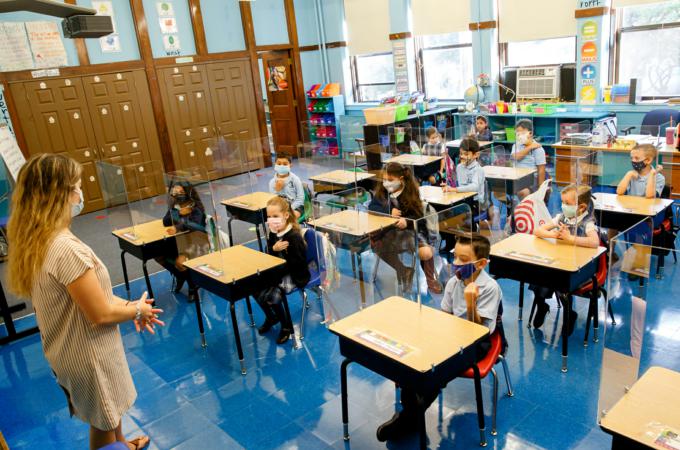We are prepared for whatever may come
''It was the best of times, it was the worst of times."
For Catholic schools, the words of Charles Dickens ring true. In this case, the "worst of times" in the spring has been followed by the "best of times" in the fall.
The pandemic forced widespread closures of the economy and of the doors of our schools and churches. The highest unemployment since the Great Depression left many of our school parents unemployed, or if they were hourly employees, with not enough money to pay their bills.
The pandemic was especially hard on children across the nation. Although they were the least likely to suffer serious cases of COVID-19, they were deprived of schools that provide social-emotional skills, meals, and access to mental-health services and other supports. In some cases, they also witnessed dramatically higher levels of family stress and, in some cases, physical and verbal abuse.
Here, in the archdiocese, each leg of the Church's three-legged stool was knocked out at the same time. Schools, churches, and social services were hit hard, facing rising needs and declining resources.
Eleven schools closed in the archdiocese -- nine schools controlled by the archdiocese and two controlled by religious orders. This was the highest number of school closures in nearly 50 years.
Looking toward the fall, we saw extraordinary risks. Two dozen more schools were on a "watch list" for potential closure. In early July 2020, enrollment for the fall was a staggering 5,722 students below enrollment of 32,400 in the school year 2019-20 -- the largest one-year enrollment drop in the history of the archdiocese.
And with the economy remaining weak, we feared the potential of even further declines. And, if the governor did not allow our schools to open for in-person instruction, we could envision a spectacularly dramatic collapse of enrollment.
Clearly, "the worst of times."
But then, things turned around.
Gov. Charlie Baker cleared the way for schools to reopen in the fall. The Department of Elementary and Secondary Education, in concert with the Department of Health, issued guidelines for reopening of schools that were reasonable, measured and flexible. Even though we are not subject to the authority of DESE, the state guidelines formed the basis of our reopening plans.
Then, the state's three teachers unions and school districts agreed to delay the opening of public schools and, in most cases, start the delayed school year with remote learning, rather than in-person instruction. Only 4 percent of public districts are offering live in-person instruction.
When this was announced in the middle of July 2020, the phones of our schools started ringing and never stopped.
Parents understood what Gov. Baker, the CDC, the American Academy of Pediatrics, the Massachusetts Health Department, and the Massachusetts Medical Society all understood: that children would be better off in school.
Rather than arguing over "whether" we should open, each of our Catholic schools focused on "how" to open. This was an essentially Catholic response. We view each child as created in the image and likeness of God, believe that we should support parents in their role as their child's first educators, and know we are called to serve.
We nonetheless faced tremendous complexity. Despite incredible supply chain issues across the globe, we had to secure masks, gloves, cleaning supplies, and other personal protective equipment. We had to train thousands of teachers and other staff on health and safety protocols. We had to reconfigure classrooms to ensure social distancing.
And we had to make sure our schools had the technology they needed to livestream classes for those students who would not be attending classes in person, either because of parental preference or because they had a vulnerable relative in their household.
The efforts of school leaders, nurses, teachers and other staff to navigate all of these challenges was nothing short of heroic. But they summoned the same energy, innovation, and commitment they did when we were forced to provide remote education during the early stages of the pandemic in the spring.
To date, since our low point in early July, we have enrolled nearly 4,000 students, bringing our total enrollment back to 30,800, with more students enrolling each day.
This is the largest summer gain in enrollment in anyone's memory. And while most public schools remain empty of students, our Catholic schools have been busy providing live, in-person instruction. Public school parents frustrated with the district approach continue to go to our website to enroll at: www.schoolswithliveinstruction.org.
As I have visited schools the past few weeks, the excitement and joy of school leaders, teachers, parents and students to be back together again is palpable. The sense of community for which Catholic schools are well-known is alive and well. We have returned to "the best of times" once again.
No one knows where the pandemic will lead or how soon a vaccine will place COVID-19 in the rear-view mirror. But, we are prepared for whatever may come. For now, we all draw great pleasure from the happy faces of children, glad to be back with their friends and teachers where they deserve to be.
- Thomas Carroll is superintendent of schools for the Archdiocese of Boston.



















